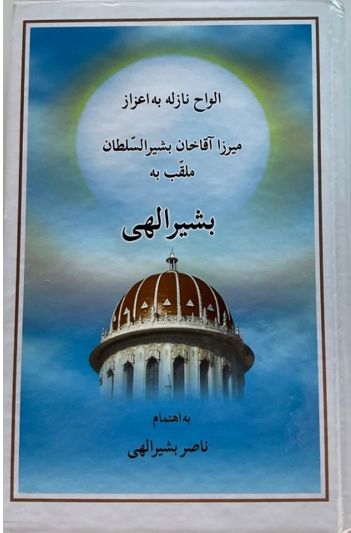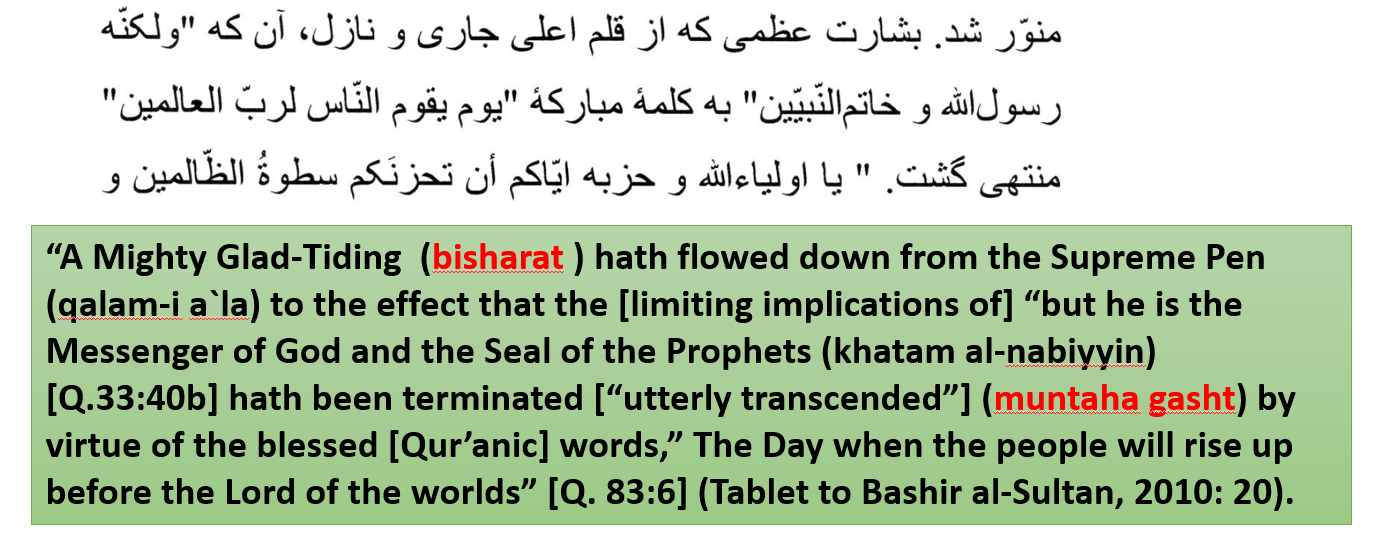
Alwah (Scriptural Tablets) in honour of Mirza Aqa Khan Bashir al-Sultan, entitled Bashir-i Ilahi.
(4)
Further Scriptural Tablets of Baha'u'llah relating to the question of the Khatam al-nabiyyin including that to Aqa-yi Bashir-i Ilahi.
Introduction, Translation and Notes
Stephen Lambden UC Merced.
In Progress - Last Updated 24-02-2023,
Aside from references to the matter of the - for some Muslims - faith-inhibiting Qur'anic genitive phrase Khatam al-nabiyyin, the loosely, "seal-acme" of the prophets" (nabiyyin - or anbiya' sing. nabi) in the two closely related Arabic and Persian texts dating to around 1280 AH (or perhaps 1281/1862) - the Jawahir al-asrar (Essence-Gems of the Mysteries) and the Kitab-i iqan (Book of Certitude) - there are other writings of Baha'u'llah that touch upon or interpret Qur'an-rooted khatamiyya ("sealedness") issues. The verse which generated for the bulk of the Muslim world, the concept of the finality of prophethood (Q.33:40b) need not be interpreted in this way. The Qur'an does not categorically indicate the cessation of the appeanence of messengers of God after Muhammmad (d. Mecca, 632 CE). It alludes to others who will follow him in the future. For Baha'is the acme or "finality" of prophethood expresses the greatness of the person and religion of the Prophet Muhammad within the religious cycle which he finalized - the "Adamic cycle" stretching from Adam to Muhammad (a more than 6000 year period) - before the coming of the Day of judgement and resurrection.
Tablets from Baha’u’llah, `Abdu’l-Baha and Letters of Shoghi Effendi for a very distinguished Baha’I family can be found in the aforementioned volume (see image above) published in January 2010. It was edited and published a volume entitled Alwah Nazilih,,, (Scriptural Tablets revealed in honor of Mirza Aqa Khan Bashir al-Sultan, entitled Bashir-i Ilahi. compiled and edited by Dr. Nasir Bashirilahi (“The One who Brings Good News”, the “Glad-Tidings” of the Kingdom of God") a leading oncologist at the University of Maryland, Baltimore, in the Department of Oncology and Diagnostic Sciences with some 72 Publications.
Several Tablets of Baha’u’llah can be found in this volume includes a Biblically rooted beatitude (tuba sentence) and a woe (wa’il sentence) containing the words :
“Blessed be such as lend an ear . And Woe be upon the negligent” (p. 20).
Then end of another Tablet
“Blessed be unto thee and whomsoever loveth thee for the sake of God, the Mighty, the All-Praised!”
The reference to the Qur'anic khatam al-nabiyyin verse (Q. 33:30b).

We see in this text that Baha'u'llah states that Qur'an 33:40b with its possible implications of sealedness or "finality" has been nullified or superceded by predictions of an eschatological theophany such as that implied in Qur'an 83:6: .
![]() The Meccan Surat al-Mutaffifin (The Surah of the Defrauders), verse 6 :
The Meccan Surat al-Mutaffifin (The Surah of the Defrauders), verse 6 :

The Day (yawm) when all humankind (al-nas) will rise up before the Lord of all the worlds (li-rabb al-`alamin)
Baha'u'llah's use of the Persian verbal phrase muntaha gasht to express this transcendence or “termination”. of the khatam al-Nabiyyin” , seal of the prophets reference (Q.33:40). This was superceded by another Qur'anic verse inplying that humanity (al-nas) would stand or rise up before a new Prophet or Messenger of God referred to by means of the theophanic "Lord of all the worlds" (rabb al-`alamin).
In another of the seven or eight Tablets of Baha’u’llah to Bashir al-Sultan, Bashir Ilahi, we read:

Baha'u'llaj again represents himself as the eschatological advent of the Deity Self-Subsisting (al-qayyum), especially this Divine attribute because it was viewed by himself and his forerunner, the Bab (d. 1850 CE) as being the equivalent to Joseph (Ar. Yusuf) both of which have an abjad numerical value of 156 (qayyum = 100+ 10 + 40 + 6 = 156) and Yusuf = 10 + 6 + 60 + 80 = 156).



